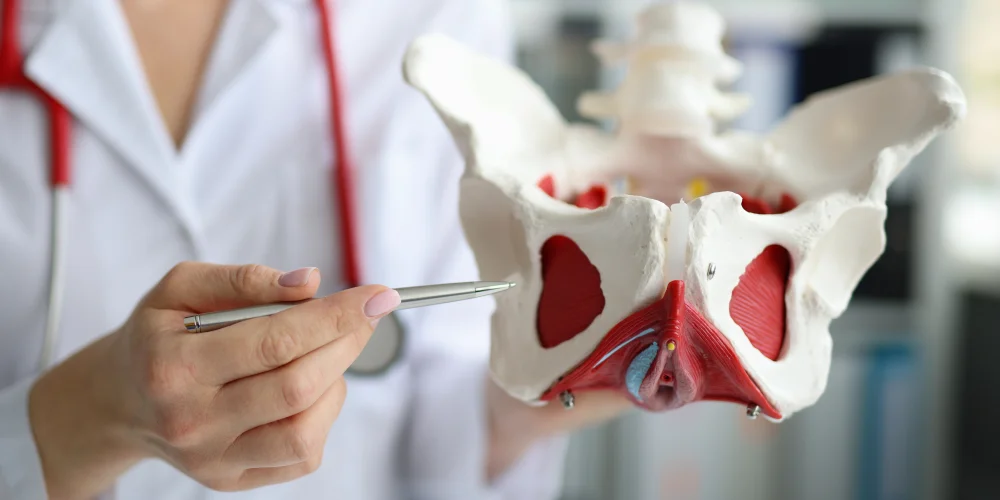Pelvic Organ Prolapse Surgery
Restoring Pelvic Health and Improving Quality of Life
Pelvic organ prolapse happens when the organs located in the pelvis, including the uterus, bladder, or rectum, fall into the vaginal wall because of weak pelvic support tissues. This can cause discomfort, bowel and urinary problems, and affect your general health and quality of living. The procedure to repair the prolapsed pelvic organ seeks to restore normal position of the organs, reduce symptoms and improve your overall health. Here at Chirayu Super Speciality Hospital, we provide expert care to treat prolapse, using the most advanced techniques for surgery and a patient-centric method to ensure the best results.

What is Pelvic Organ Prolapse Repair?
The repair of pelvic organ prolapse is a surgical procedure that is designed to repair the deformation of pelvic organs as the supporting tissues get less strong or have been damaged. The procedure involves repositioning of the organs prolapsed, and also strengthening or repairing the pelvic support structures in order to improve function and relieve symptoms. The aim is to improve the patient’s comfort, reduce recurrence and improve your quality of life of those suffering from prolapse-related problems.
Who Performs Your Surgery?
Repair surgeries for pelvic organ prolapse performed at Chirayu Super Speciality Hospital are performed by a group of highly skilled gynecologists as well as Urogynecologists that specialize in pelvic floor issues. Our surgeons are experienced in both conventional and minimally invasive procedures making sure that each patient receives the best and efficient treatment. This surgical group is assisted by nurses, anesthesiologists and other health experts who offer comprehensive assistance throughout the procedure.
Types of Pelvic Organ Prolapse Repair Surgery
- Vaginal repair (Anterior/Posterior repair) : This procedure involves fixing the vaginal walls to treat the anterior (bladder) and the posterior (rectum) prolapse. The procedure is carried out via the vagina, which reduces the need for external incisions, resulting in an earlier recovery.
- Abdominal Repair : A abdominal approach can be employed to fix prolapse of the uterus, or other pelvic organs. This procedure could include open or laparoscopic surgery, based on the severity that the prolapse.
- Sacral Colpopexy : A surgical procedure in which mesh is utilized to help support the vaginal vault and return the normal position. This method is commonly employed for prolapses that are more severe and is possible to do laparoscopically.
- Hysterectomy and Reconstruction of Prolapse : If the uterus is implicated in the prolapse and the uterus is involved, a Hysterectomy (removal from the uterus) could be combined with prolapse repair to deal with both issues at the same time.
Symptoms Indicating the Need for Pelvic Organ Prolapse Repair
- Protrusion or bulge visible within the vaginal area.
- Pressure on the pelvis or discomfort particularly when standing or working hard.
- Urinary problems such as frequent urination, leakage or problems with getting the bladder empty.
- Constipation or difficulty in controlling the bowel movements.
- Pain during sexual intercourse.
- A feeling of fullness or weight in the pelvic region.
Diagnosis for Pelvic Organ Prolapse Repair
The diagnosis of pelvic organ prolapse usually involves a thorough medical examination as well as physical examination as well as a pelvic exam. The examination could include physical examination and palpation of pelvic organs to evaluate the severity of prolapse. Other tests, such as Urodynamic studies or imaging could be conducted to assess the function of the bladder and bowel. Based on these assessments your gynecologist will suggest the best surgical procedure to repair prolapse.
Treatment Process
The treatment process starts with a thorough consultation in which surgeons will go over surgical options, advantages as well as potential dangers. The decision on which approach to use will depend on the nature and severity of the prolapse in addition to your general health. The surgery is done under regional or general anesthesia in order to provide comfort. After surgery, patients receive instructions on care, such as the management of pain, restrictions on activity as well as subsequent appointments. The majority of patients will be in the hospital for a short time and then gradually return to their normal routine.
Care and Recovery After Surgery
Post-operative treatment for pelvic organ prolapse repairs involves the management of pain, observing limitations on activity and attending follow-up appointments. Patients might experience discomfort that is usually controlled with medications. The recovery time is dependent on the procedure utilized; vaginal repairs typically are less prone to recovery when compared to abdominal approaches. It is essential to follow the instructions of your surgeon to make sure that the healing process is complete and reduce the chance of complications. The team of care will offer instructions on how to resume regular activities and addressing any post-surgical discomfort.
Advantages of Choosing Our Surgery Services
Experienced Surgeons
Our team of highly skilled gynecologists and urogynecologists specializes in pelvic organ prolapse repair, ensuring precise and effective treatment tailored to your specific needs.
Customized Treatment Plans
Each patient receives a personalized treatment plan based on the type and severity of their prolapse, as well as their overall health, to achieve the best possible outcomes.
Holistic Patient Support
We offer comprehensive support that includes counseling and educational resources to help you understand the procedure, manage recovery, and maintain pelvic health.
What Our Patients Say
Read about our patients positive experiences and how Chirayu Super Speciality Hospital has positively impacted their health and well-being.


I’m thrilled with the results of my prolapse repair surgery. The discomfort is gone, and Chirayu care made all the difference.


The care team was attentive and professional. The surgery was successful, and I’m relieved to be free from the symptoms of prolapse.


The vaginal repair was effective and my recovery was quick. Chirayu team made the entire process smooth and manageable.


My pelvic organ prolapse repair at Chirayu was life-changing. I’m free from discomfort and very satisfied with the results.
Meet Our Medical Specialists
Our experienced gynecologists and urogynecologists specialize in pelvic organ prolapse repair, offering advanced, compassionate care to restore pelvic health and improve quality of life.
Frequently Asked Questions
Here, we provide answers to some of the most commonly asked questions to help you better understand about our surgery services. If you have any additional questions, please do not hesitate to contact us.
Recovery time varies; vaginal repairs generally have a shorter recovery period compared to abdominal approaches, with most patients resuming normal activities within a few weeks.
Some discomfort is normal, but pain is usually manageable with medication. Recovery varies based on the surgical method used.
Surgery may be needed if you have significant symptoms, such as pelvic pressure, urinary or bowel problems, or a visible bulge, and other treatments have not been effective.
It is a surgical procedure to correct the displacement of pelvic organs caused by weakened support tissues, aiming to restore normal function and alleviate symptoms.
Types include vaginal repair, abdominal repair, sacral colpopexy, and hysterectomy with prolapse repair, depending on the severity of the prolapse and individual patient factors.



